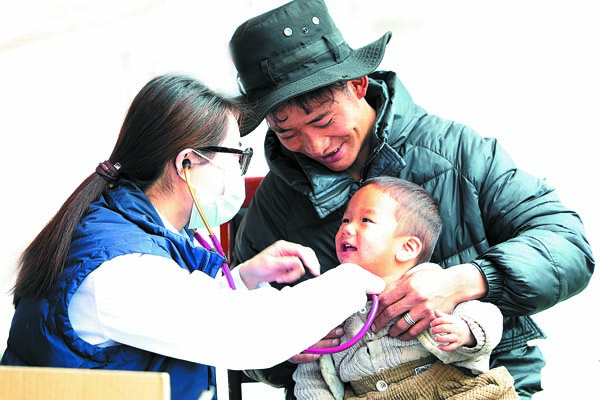A passion to heal taken to new heights


Doctor initially finds Tibet challenging but soon feels at home as she provides valuable care, Wang Ru reports.
Zheng Wanqi had never visited the Tibet autonomous region, nor heard of Nagchu, a prefecture-level city in the area, before she visited as a doctor participating in a program to provide medical aid in 2021. But now she has built a bond with the place and its people.
Back in 2020, Zheng's journey began with a phone call to her family. She had worked as a pediatrician at the Second Hospital of Dalian Medical University for nearly a decade. The journey from Dalian, a coastal city in Northeast China's Liaoning province, to Nagchu in northern Tibet, at an average altitude of more than 4,500 meters, was more than 4,000 kilometers.
She arrived at Nagchu People's Hospital in early 2021 with several other colleagues, as the fifth batch of doctors from Liaoning to assist Tibet, and began their work, which was initially expected to last 18 months.
At first, just as she imagined, she found it difficult. "I had serious altitude sickness. I often felt dizzy, wanted to vomit and my limbs were weary and stiff. It was also difficult for me to sleep," says Zheng.
With its high altitude, Nagchu has low oxygen level and air pressure, which posed a challenge to Zheng. Luckily, she gradually got used to the environment and was able to continue her work.
She soon discovered the situation at work was totally different from what she was used to. Since Nagchu covers a vast territory with a sparse population, and Nagchu People's Hospital is the largest such facility in the northern part of Tibet, many patients traveled from afar to receive treatment.
"The long and tiring journeys often worsen their illness. When they arrive at our hospital, the condition of the patients has often deteriorated," says Zheng.
Consequently, it's more stressful than her usual work in Dalian treating children with mostly common ailments. "This situation requires us to have the ability to identify the disease and treat it as early as possible. The moment they arrive at the hospital, we must immediately carry out systematic treatment," says Zheng.




































